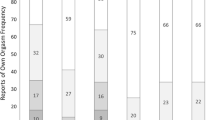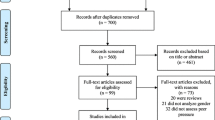Abstract
Students completed a questionnaire measuring acceptance of forcible date rape, attitudes toward women, sexual knowledge, sexual experience, tolerance of socially unapproved sexual behavior, and religiosity. Findings suggested that persons relatively more accepting of forcible date rape are less sure it really is rape, have more traditional attitudes toward women, are more selfsexually permissive (i.e., more tolerant of their own socially unapproved of sexual behavior, such as premarital and extramarital sex with friends or casual acquaintances), have less accurate sexual knowledge and, though a large majority blame the male, are slightly more inclined than others to blame society or the situation. These predictor variables accounted for 35% of the variance in attitudes toward forcible date rape and identified correctly about two-thirds of the students classified as nonrejectors of forcible date rape, i.e., those who did not consider the male's behavior definitely unacceptable under any one of nine circumstances, including “He spent a lot of money on her.” In addition to the emotional and personality variables often cited in rapists, the cognitive predictor variables found may be salient to understanding the etiology of rape.
Similar content being viewed by others
References
Allgeier, E., and Hyde, J. S. (1979).Instructor's Manual for Understanding Human Sexuality. McGraw-Hill, New York.
Alport, G. W., and Ross, M. J. (1967). Personal religious orientation and prejudice.J. Pers. Soc. Psychol. 5: 432–443.
Bendel, R. B., and Afifi, A. A. (1977). Comparison of stopping rules in forward “stepwise” regression.J. Amer. Stat. Assoc. 72: 46–53.
Cohen, J., and Cohen, P. (1975).Applied Multiple Regression Correlation Analyses for the Behavioral Sciences. Wiley, New York.
Giarusso, R., Johnson, P., Goodchilds, J., and Zellman, G. (1979). Adolescent cues and signals: Sex and assault. Paper presented at meetings of the Western Psychological Association, San Diego.
Harmatz, M. G., and Novak, M. A. (1983).Human Sexuality. Harper & Row, New York.
Kanin, E. J. (1985). Date rapists: Differential socialization and relation to deprivation.Arch. Sex. Behav. 14: 219–231.
Mahoney, E. R. (1983).Human Sexuality. McGraw-Hill, New York.
Rapaport, K., and Burkart, B. R. (1984). Personality and attitudinal characteristics of sexually coercive college males.J. Abn. Psychol. 13: 216–221.
Spence, J. T., and Helmreich, R. L. (1978).Masculinity and Femininity: Their Psychological Dimensions, Correlates, and Antecedents. University of Texas Press, Austin, TX.
Spence, J. T., Helmreich, R., and Stapp, J. (1973). A short version of the Attitudes Toward Women Scale (AWS).Bull. Psychon. Soc. 2: 219–220.
Author information
Authors and Affiliations
Rights and permissions
About this article
Cite this article
Fischer, G.J. College student attitudes toward forcible date rape: I. Cognitive predictors. Arch Sex Behav 15, 457–466 (1986). https://doi.org/10.1007/BF01542310
Issue Date:
DOI: https://doi.org/10.1007/BF01542310




